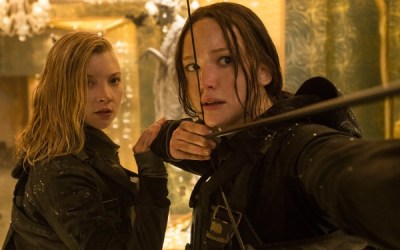There are few laughs in The Hunger Games franchise, and its final instalment Mockingjay – Part 2 may be the most po-faced of the lot. With the series’ two most reliable comic relief characters, Effie Trinket (Elizabeth Banks) and Caesar Flickerman (Stanley Tucci), only making brief cameos, there’s little light to perforate the the dark here, but its relentless gritted teeth has always been The Hunger Games’ greatest strength. It’s also taken great care to make its characters’ stakes and motivations clear throughout.
 Much of this investment is down to Hollywood darling Jennifer Lawrence, who has turned in an intense performance throughout, her face ably standing in for the first-person narration of its source material as she processes the complicated emotions and decisions Katniss Everdeen goes through at every turn. But its also down to director Francis Lawrence, who has proved himself adept at finding the story’s emotional beats and making them sing ever since he took the helm for Catching Fire (2013).
Much of this investment is down to Hollywood darling Jennifer Lawrence, who has turned in an intense performance throughout, her face ably standing in for the first-person narration of its source material as she processes the complicated emotions and decisions Katniss Everdeen goes through at every turn. But its also down to director Francis Lawrence, who has proved himself adept at finding the story’s emotional beats and making them sing ever since he took the helm for Catching Fire (2013).
By steadying the shaky-cam aesthetic that had plagued the first outing, Lawrence taps into the story’s melodramatic heart. Even during the disappointing Mockingjay – Part 1 (2014), which suffered from its languorous pace and lack of a real climax (let alone its lack of any actual games), Lawrence managed to make key moments soar, looking through the blockbuster gloss and dystopian-action milieu to find the real emotions at its core. Mockingjay – Part 2 does suffer from some of the pacing issues that plagued its first part – a trimmed-down single film would have been ideal, of course – but it does have far meatier material to work with, and once Katniss and her team finally storm the Capitol the film finally gives us the elaborate death traps and pounding action that had defined the series previously. Unfortunately, it cannot avoid wasting time on the utterly redundant love triangle subplot that has dragged the entire series down since the start and which here feels even more shoehorned in than before, particularly as Gayle (Liam Hemsworth) and Peeta (Josh Hutcherson) are developed more carefully than in the past, meaning their characters could have stood alone as more than simple love interests.
As is to be expected of the climax of such a bleak series, the death toll is high, but the film takes time to give each character their due, and new characters – in particular the always-fantastic Michelle Forbes as the team’s hardened squad leader – stand tall next to the franchise’s stalwarts. Due to its label as a YA franchise, its poppy aesthetics, and its obvious referencing of previously-existing works from Battle Royale (2000) to Nineteen Eighty-Four, The Hunger Games has been easily dismissed in some quarters as dystopia-lite. But rather than look at its similarities to its forebears, one must look at what it does new, and in particular its focus on propaganda, the PR of the war machine, feels original and startlingly current. In the genuinely shocking and surprising third act, it wades deep into the moral shades of grey at the story’s core and comes out the other side with no easy solution. There’s more than a little irony in the fact that a gigantic movie studio has spent millions of dollars on a film franchise about the poor and needy rising up against the violent excesses of a wealthy elite, but its conclusion suggests that there’s more to greed and power than money, and that it doesn’t always look like a grasping, evil dictator. For all its flaws, with Mockingjay – Part 2, The Hunger Games has cemented its position as the more sophisticated, thoughtful franchises of the decade.
Adam Howard | @afahoward


